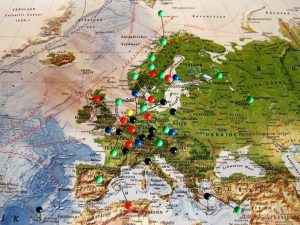Report with the most promising paths and areas of cooperation for regions
New confidential deliverable D6.2 was delivered to European Commission

The bioeconomy has the potential to mitigate climate change through emission reductions and the capturing of carbon in soils, biomass and, ultimately, in bio-based products that substitute fossil-based ones. The development of value chains that promote greater resource efficiency, circular use of materials and storage of carbon also offer rural areas new opportunities to generate economic value. Balanced and sustainable territorial development supports cohesion and requires investments in both rural and urban areas. In any of the cases, the regional authorities have a significant role to play. Cross-border cooperation activities are meant to foster those environments to further exploit bioeconomy initiatives.
Cross-border cooperation between regions is a great opportunity to increase incomes: advice, knowledge sharing, networking, cooperation to build capacity, generating evidence and baseline data. This exchange of knowledge, abilities and skills can be useful for inter-country or inter-regional comparison.
Also, advice, knowledge sharing, and cooperation are key to upscale the use of resource efficient practices in the agricultural sector in particular, in many cases, with strong links with regional policies. Feasible ideas for change often originate among the practitioners themselves, which highlights the importance of networks and knowledge exchange. Upscaling of good practices can also be promoted using tools such as quality schemes (either creating new schemes or adapting and recognising existing ones) to qualify for a premium for taking certain actions. In sum, the cross-border cooperation initiatives could expand concepts and new lessons learnt of interest to the POWER4BIO regions. It can also bring together actors in networks to cooperate and develop such approaches. These schemes may operate along a supply chain or at regional level to promote more sustainable products and supply chains.
Cross-border cooperation alliances demand time and a close contact with regions in open-minded environments. In some cases, the role of a facilitator might increase the chances of finding common goals and later, to set up some more in-depth analysis. This is also part of the endeavours of the work presented in this document as an enabler to matchmake regions with potential common interests.
POWER4BIO project has implemented dialogue mechanisms to generate local connections between the participants of the 10 regions, the evidence base for locally relevant climate action and innovative solutions needed. Even, the cross-border cooperation has been enlarged to neighbouring regions. Cooperation with those located near or sharing borders should be also a priority in many cases, in the search of synergies, and specially, common interests.
Lastly, the activities carried out included input-output analysis between the POWER4BIO regions. The POWER4BIO project accounts for 10 regions covering a wide range of sizes, needs, climatic conditions and economic boundary conditions. This large representation of situations and bioeconomy challenges and opportunities made this exercise an extremely rich comparison and triggering initiative to boost current and future collaboration opportunities between them. To this end, geographical scale and each region ‘capacity have been carefully studied in order to capture the EU regional and national-level interactions.




